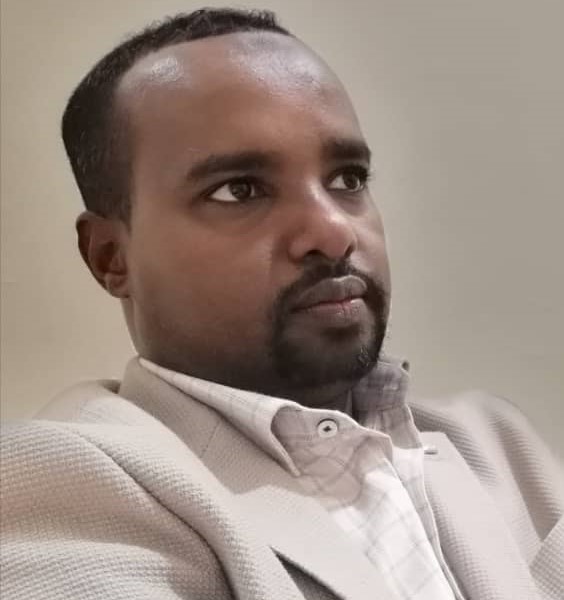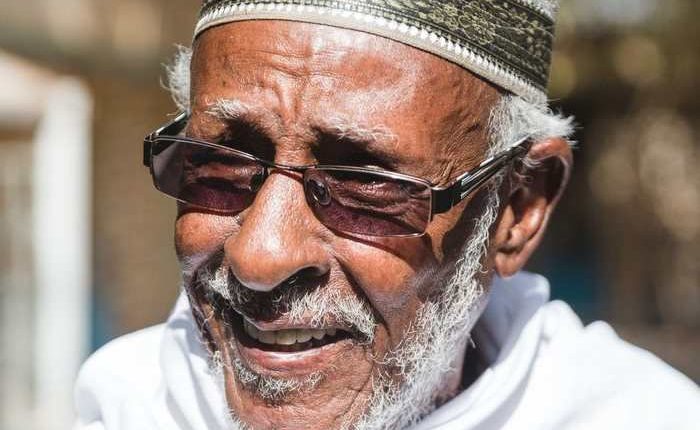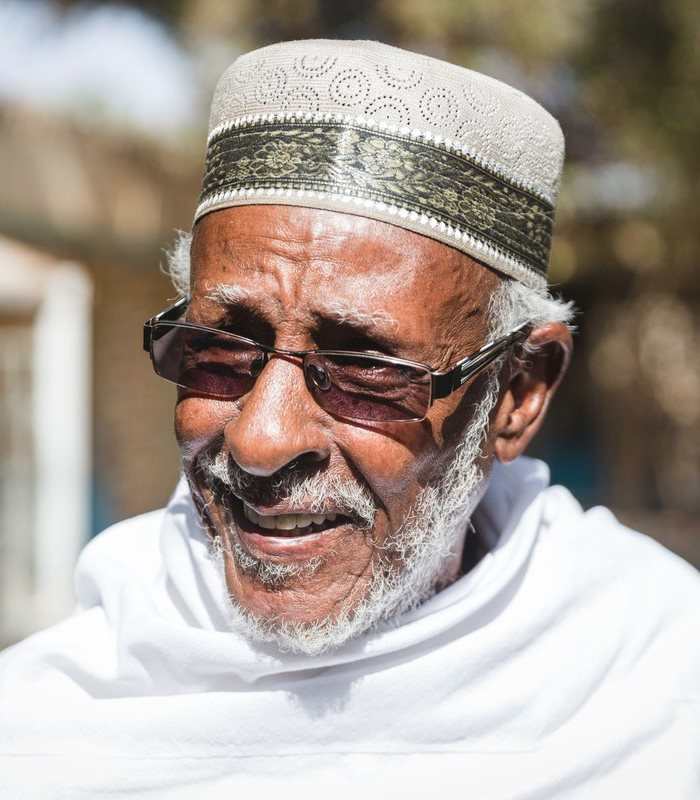In this regard, Mohamed I Warsame alias “Hadraawi” is the most prominent Somali poet and educationist who contributed the most precious, most heartfelt, and enduring literature about women and for women; without much contest.
Hadraawi, a former professor of literature at the National Somali Univerisity, a songwriter, historian, and thinker, can be deservedly appointed to be Somali women’s spokesperson: the champion of their rights, and the defender of their status, and wellbeing in society. At any stage of their journey in life, at every situation they are passing through and with whatever experience they are having, he stood by them and took their side: dispensed priceless advice and contributed moral lessons for decent and dignified lives. He is a man who never shies away from confronting the conventional norms by adopting the instruments of active persuasion while dissecting the misfortunes, sins, and violations men inflicted and continue to exact on women
Indho-Badan epic is a marvellous example of such courage, eloquence, and style. Hadrawi starts the poem with several verses that could take numerous equally ambiguous interpretations as he usually does with his poems’ prologue; he always calls upon readers to bother themselves and deliberate on the meaning, purpose and message behind his polemics. For me, the introductory stanza carries a nostalgic historical memory of a time women had the upper arm. Hadrawi’s reminiscing about Araweelo’s era can be subtly discerned from the verses; nevertheless, he wonders whether the subjugation women face today resulted from a longstanding vendetta instigated by bygone transgressions committed against men by the legendary queen while she appropriated the authorities of a betrayed king. Such hypothetical question seeks to answer the mind-boggling “why” behind the ruthless aggression women currently endure.
Hadrawi, then, proceeds to remind us of the volatile reality of our existence on this world; he draws our attention to the inevitability of change by drawing examples from our natural habitat in an attempt to capture the astonishing simplicity of changing tides and how they can sweep our fate into unpredictable fortunes. “Ban aroori kaxaa- Mar ugbaadku sima. Meel aboor degey ba. Mar iftiin ka baxa.. Gole aammus badna.. Mar mar baa idhi taa.. Anda-qaad ku bataa.” In this few verses, he rejoices how an arid, dry and deserted prairie, sometimes flourishes with abundant flowers and greenery; how a site infested by termites buzzes afterwards with life; and how a council gloomily succumbed to silence for a long time, suddenly revives with boastful chatter.
Ubah, a young orphaned girl, has been living in abject deprivation for many years: hungry and malnourished, unadorned and dishevelled, thirsty and dehydrated, uneducated and her future neglected. As human conditions seldomly forever last, the time has turned to her favour, and she has grown into young belle: beautiful, meticulous and warm. Surprisingly, she is is getting unwarranted attention from men who were recently oblivious to her very existence, not because, at last, a spell of compassion engulfed them, but because their lustful urges led them on a leash like a camel hurriedly en route to a waterhole. Everyone wants to reach her first, to win the trophy, to shriek on her agony when he slaughters her soul and her dignity; when he disgustingly defiles her innocence.
Hadrawi had been following the girl’s saga from the beginning; observing her every step, notwithstanding the lavish affection being sprinkled upon the damsel and her credulous gullibility, he sensed danger; therefore, he had to intervene. Engulfed by emotional rage, he composed one of his most impassioned poems in which he took sorts of men to a harsh public court without clemency: the Indha-Badan tercet interspersed with examples from real-life scenarios and brilliant logical deductions.
Hadraawi directed the arrows of censure and condemnation at men and their irresponsible delinquencies, their lustful chase behind instant lewd pleasures regardless of the everlasting devastation and pain their profane actions leave behind “Naca jooji arbow.. Eela weynta hambee.. Ayaxow ayaxow.. Ayaxow weligaa.. Ayda waad dhilataa.. Eelna waad ka tagtaa.. Aafadaada miyaa.. Aagna looga gudbayn?”
He draws a profound analogy of man’s sex-driven coursing to that of swarms of hungry locust. Locust, hastily consumes large fields of cultivated land with the slightest concern of the consequences, and indeed, without quenching its greed; in parallel to that, men, with their uninhibited debauchery erode compassion, empathy and caring out of the wounded hearts of those girls they led astray with their lechery. He exclaims; how a man who wickedly desecrated a dozen girls’ prime beauty can, yet brazenly, desire a flawless chaste bride?.
Hadraawi takes Ubah’s memory back to the days of her invisible childhood when she was lonely, bereaved, deprived of childhood enjoyment, hungry for, cold, and needed support and care; why hadn’t they dispense before a snippet of the attention these raunchy camels showering on her. Hadraawi counts many ways they could have helped her overcome her parents’ loss and build a bright, productive life. They missed all those opportunities to better your life because you were not appealing to their deviant motives; you were not ripe enough to satisfy their animalistic concupiscence “Abeer baanad ahayn. Oogadaan ku billayn…Awrtan qooqday haddeer..Abaar ba kulanteen”. In a fatherly manner, the poet stresses that she owes nothing to them; hence, she must be very doubtful about their fervent advances towards her and be careful about their plans.
Written with the usual beautiful melodic lyrics characteristic of Hadraawi, the poem dispenses an invaluable lesson about the treacherous deceptions men use to prey on unsuspecting young women. It unapologetically delves into the always unspoken taboo of malign courtship by exposing the multifaceted honeytraps some morally dry men employ to entice women to let go of their guard and surrender their dignity.
To confirm that his advice has produced the expected outcome and not to leave misinterpretation a room in his message; the poet poses a rhetorically educational question “rag miyaad Ubaxeey alabkiisa taqaan?”. Ooh Ubah, do you know the tricks of men?
His response comes with a stomach-churning depiction of utmost cruelty and a frightening absence of a living conscience from some self-absorbed men “Asaydaada mar buu Ashqaraar huwiyaa.. Al-alooska gobeed.. Waa ka aar gudashoo” Sometimes, in pursuit of their masochistic pleasures, they throw an adorned garnish on your coffin. The compliments, gifts, and exaggerated courtship, are nothing but a prelude to an old and renewed bitter revenge that men cover with a silk embellishment. It is a plot to steal your most precious and dearest possessions: they steal your innocence, your femininity, your dignity، your humanity, your independence, your peace of mind, and the purity of your soul.
Oh Ubah, hyenas do not shed tears with their prey the moment they implant their fangs in their ribs “Lama ooyo dhurwaa.. Ishinkuu legdadee”. Likewise, men do not sympathise with the girl they robbed of her innocence. Her misfortune signifies a victory for their cunning and deceit; her tears are nothing but a moment of pride and ecstasy overwhelming them with happiness and self-admiration “Gabadh iilatay hooy.. Ayaanteeda madow.. Alwadkeedu ninkuu..Alalaas geliyaa.. Uur ku taallada wuu.. Wuu ka iidsanyahoo”
After that frightening warning, perhaps to further confront her with the harsh reality, he holds her hand to make her witness for herself some of those who did slip into the snare. Knock this door, says the poet, how many groans, wailings and feelings of panic are coming from behind it. In this room, a new mother has sadness, remorse, and frustration clouded her soul; Bitterness filled her heart because dogs just devoured her newborn “Ba albaabkan garaac..Ummul baa hurudee,..Wax ku oogan xanuun..Aamanuun gubayoo..Umal baa shidayoo..Ammuurii dhacay bay..La asqaysantahoo.. Ilmahay dihataa xalay eydu cuntee”.What happened to the mother’s mercy and tenderness? All disappeared when a grave injustice is inflicted upon her.
Here, the poem emphasises one fundamental fact; the eternal relationship between the fair and dignified treatment a woman receives from her espouse, her family and the society and the empathy, compassion and care she showers upon his offspring. It asserts that a mother’s mercifulness emanates from the modest righteous manner through which her womanhood is legitimately owned “Naxariista Illayn.. Anshax baa dhaliyee”. The pride and honour she feels when she is proposed to and graciously wedded are transmitted to her offspring in the form of kindness and love.
Sexual liberalism is a hallmark of the modern feminist’s idealogy to the extent that some extremists among their ranks fight for altogether abolishing traditional norms and religious morals and call for the adoption of a hedonistic approach to human intimacy and intercourse through personal choices; Hadrawi considers sex outside legitimate wedlock, a violation of a woman’s honour and deep dent into her self-respect.
She, alone, bears the brunt of the worst humiliation and disgrace; even though two are responsible for the despicable act, only she, is blamed for the disappointing outcome. she receives a painful rejection and shame for her entire entity, not just for the sin that could be atoned by sincere contrition. Subsequently, her kind, motherly heart is filled with rage, despair, and resentment that impels her to ditch her baby for the wild dogs “Haddii uurka habreed.. Astaan gaara lahaa..Hooyadii amranayd..Arxan goysey markuu.. Xeer illow ku dhacoo.. Ubadkii magantaa.. Haadku eeganayaa“.
Finally, Hadraawi issues a red alert for the girls at the age of Ubah; warning them about playfulness, vainly seeking men’s attention, and being cheaply attainable. He emplores with them to be vigilant and to tread cautiously when approached by men. He emphatically reiterates his previous beastly depiction of men “Ubaxeey bahalaa.. Ku ilaashanayoo..Ubaxeey hororaa..Ku ugaadhsanayoo..Araraa kugu dhow..Orgobaa fadhiyoo” Ow Ubah, brutes are hovering around you, watching; degenerates are hunting you. Around your vicinities, monsters are lurking waiting to pounce upon you in a moment of indiscretion. All are anticipating you to slip and let go of your guard, so don’t be like a mute mule that a hungry savage can quickly gorge. Men are only turned away by a thick injurious stick; hence, it is your adoration, if you keep your gems save even from me “Rag ul baa celisoo..Ka adkayso qudhay.. Amaantaadu tahee.”
Hardaawi’s objective was not to drive a wedge between men and women nor to masculate women at their partners’ expense; he aimed to awaken our consciousness to a vital prerequisite for creating a healthy, well-balanced civilised society: the position of women, whether they are old and frail, young and vulnerable or mature and strong is what he intended to define. His outlook into the issue emanates from a traditionalist perspective blended with simple religious moralism. Education of girls stands out as the most important tool a society can adopt to uplift and empower the soft sex. Hence, Hadrawi emphatically mentions education repeatedly in this poem
“Alif waa derejee.. Aqoon may ku geshaan.. Erey may ku faraan.. Loo adeegsado meel.. Aayahaaga hor yiil.. May ammaan ka dhigaan”. That tool is still valid for the purported goal and although we have come a long way since this poem came to life, yet young girls are lagging behind their male peers in the numbers enrolled in schools every year. Such sad reality makes it imperative for us to transform Hadrawi’s message into guiding principles for re-balancing our society to prevent opportunism for hitchhiking a critical national matter.
ABOUT THE AUTHOR

Dr. Abdikarim D Hassan is a medical doctor and a freelance writer who writes about social issues.
This article first appeared in the Somaliland Chronicle and is republished with permission.











Comments are closed.